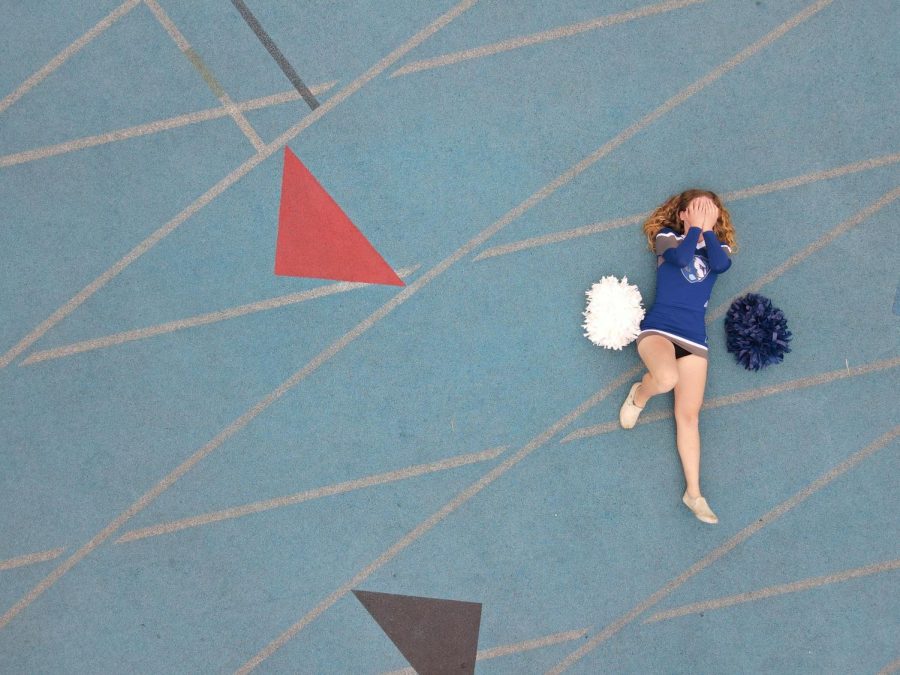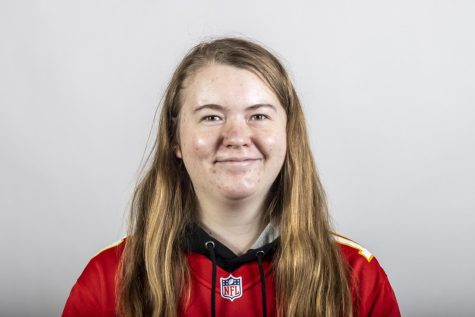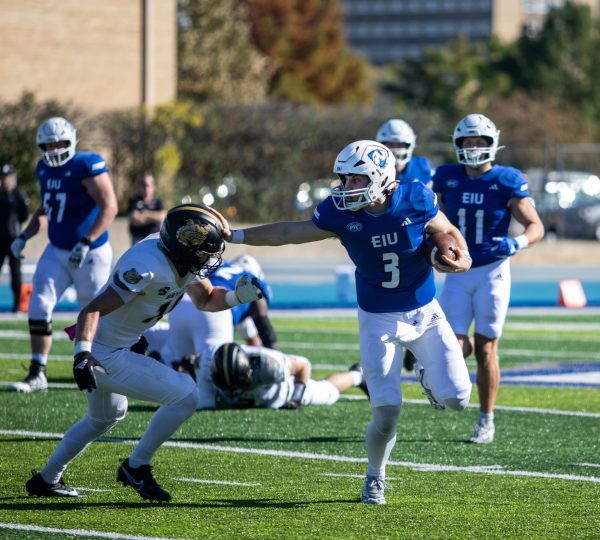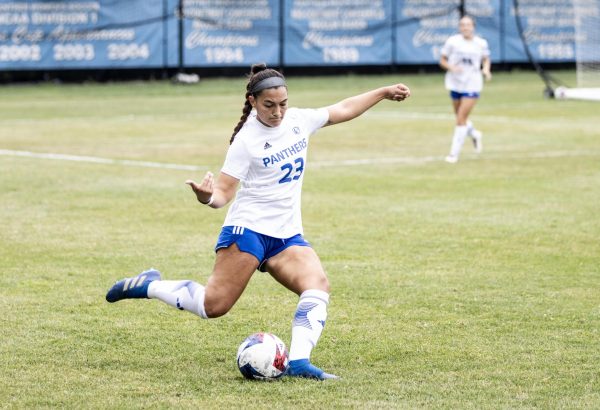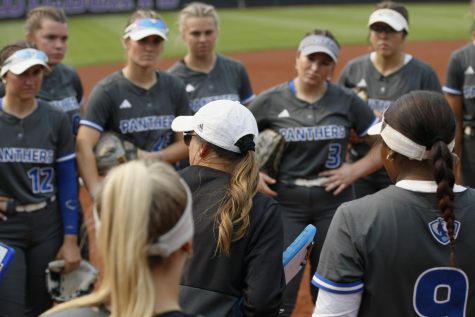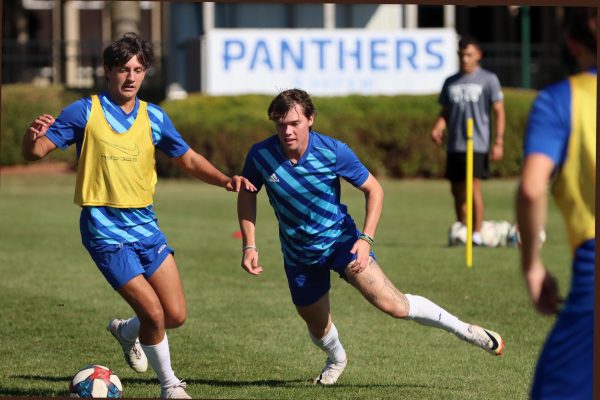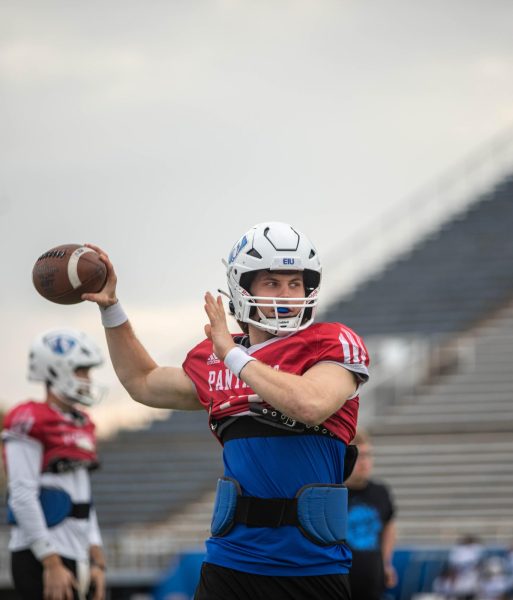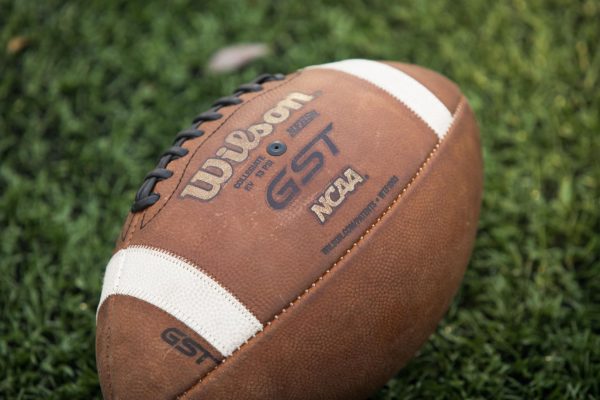‘How many does it take for something to change?’
Eastern Cheerleader Katie Frankovich, a sophomore communications disorders holds her hands in her face symbolizing being overwhelmed at O’Brien Field Monday afternoon.
September 14, 2022
Collegiate student athletes often use their respective sport to cope with the pressures of balancing academics and their athletic performance.
However, student athletes here at Eastern said that when their sport is no longer their outlet, their mental health declines.
Jenna Little, a junior midfielder on the women’s soccer team, said that the pressure of not falling short for her team is heavy, but is sometimes outweighed by their support.
“On top of the usual struggle of working for play time and trying to do the best I can on the field, I’m making sure I’m still succeeding in the classroom. This can be a lot to juggle at once and feel overwhelming a lot of the time,” Little said. “The weight of trying to not let your coaches, teammates, teachers and yourself down is probably one of the hardest things I’ve dealt with and continue to deal with as a student athlete. Despite all of this, being on a team that supports you and having coaches that check in on you and help you with whatever you need has also helped my mental health.”
Little has had many injuries throughout her two years here at Eastern and is currently suffering from one that will require surgery later this year.
Injuries wear on her mental health, but Little said that she relies on her faith when things start to become too much for her mentally.
“Personally, my faith is what helps and protects my mental health. As a Christian, I think that despite everything I am going through or will have to go through as a student athlete, there is a reason for it all,” Little said. “Spending time with other athletes and people who believe in the same things that I do, helps remind me of the plan that God has for me. This makes it easier for me to go through things that weigh heavily on my mental health.”
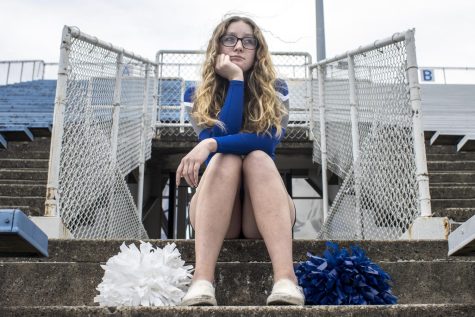
Another member of the women’s soccer team, who asked to remain anonymous for this article, said that her identity as an athlete is sometimes harmful because when her performance deteriorates, so does her mental wellbeing.
“I feel like a lot of my identity is entangled into who I am as an athlete. If I’m injured or have an off day, then my mental health doesn’t do as well,” she said. “I also have been taught my whole life to be strong and push through pain physically but that has seeped into my views of mental health as well. So, it’s really hard to ask for help or a break even If I need one.”
The athlete also said that her relationship with food adds to the mental pressures of being a collegiate athlete.
“Another thing is eating. So many athletes I know have a terrible relationship with food. It’s hard to eat on off days or light practice days,” she said. “So many female athletes, especially, have image issues. I constantly compare myself to girls who do not play sports and it’s hard to understand that my body helps me perform.”
The athlete echoed Little by saying that when her performance on the field is not up to her standards, it is hard to keep a positive mindset.
“It’s hard to protect my mental health and I struggle to do so. Soccer has been my outlet and has helped me through mental battles, but when it is no longer my escape, I have nothing really,” she said. “Seeing all of the news stories and athletes who have taken their own life makes me question a lot. I know so many athletes struggle with their mental health, and it leaves me questioning who’s next or how many does it take for something to change.”
A defensive student assistant coach for the football team, who requested to remain anonymous for this article, said the stigma surrounding mental health is changing but it is nowhere near completely disappearing.
“We constantly check in with guys, try to give them as much help and rest as they need, the unfortunate part is that a lot of times guys don’t come talk to us about struggles because they think it’ll hurt them on the field,” he said. “We can’t read minds, so we have to sometimes just take their word. There needs to be a culture of openness and transparency, especially about mental health, it’s getting there, but far from where it needs to be.”
An athlete on the women’s soccer team, who asked to remain anonymous, said that adjusting to life as a student athlete was very different from the life they had back home.
They said that sometimes being a “student athlete” is not always the case because athletics are stressed more than academics.
“Everyone says you’re a student first but sometimes I felt that wasn’t the case. We have a busier life than non-athletes and I thought I would do very well since I was used to combining my studies with soccer, but I was wrong,” she said. “During the season, since we have to travel, we had to get ahead of classes because we missed some and it was our responsibility to tell the teacher and do the homework early. My first two years, I fell behind a lot, and it affected my grades a lot.”
The athlete said that putting themselves first has helped their mental state improve.
“During my last semester of my senior year, I decided I was going to keep playing two more years because I really enjoyed being on the team, but because of my friends, not because of my coaches,” she said. “I knew that trying to put someone ahead of my mental health was the mistake I made over the last few years, so I decided that I wanted to have fun with my teammates and enjoy my last few years with them. It really helped me to put my mental health ahead because now I feel happier with myself and I can enjoy training again.”
Autumn Schulz can be reached at 581-2812 or [email protected]






































